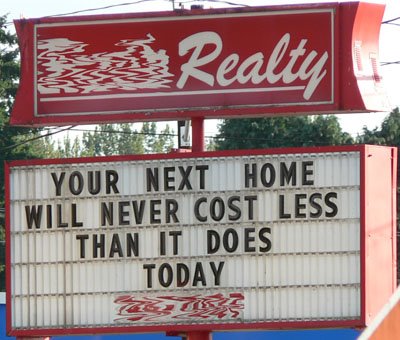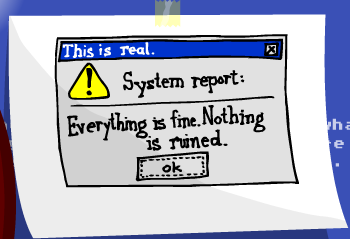I got into a great argument with one of my allied real estate professional hate mail fans recently. It was good. Educational and revealing too. Not too much spit exchanged. Not like an in your face Lou Piniella type tirade, but quite animated. Man, can you imagine the comments from Lou over the past couple weeks if he was still the Mariners manager? It would have been really funny seeing him explode in the clubhouse after this dismal road trip. Anyway...
We agreed on one issue. I was early thinking that our market was exibiting bubble like tendencies. Mostly because of witnessing first hand the type of financing making it possible for consumers to purchase homes that in markets of past, there was no way the borrower would qualify. But the other reason was due to being personally involved in multiple offer situations back in the fall of 2004. I knew right then that the buyer of the home that successfully out bid ours and two other parties, probably paid more than they should have. But who am I to judge. Maybe for reasons unknown to me, the property was worth it to them. You can never fault someone for that. I would also guess that the other buyers were not armed like me with the mortgage information about the existing seller, nor armed with information that the home had just been purchased three months earlier.
The question of whether the Seattle market will follow the footsteps of other markets that have had sales drop off significantly is what our argument was really about. In localized areas of our market, multiple offers still continue. Sales levels are dropping off ( I know I know, the "median" thing...). I can tell you that our summer business was less than that of '05. Bummer.
In escrow, from my perspective, there is no other position in real estate where you see the good and bad in a real estate transaction. You see and hear it all. Almost without question, 95% of the comments excited buyers make at the signing table relate to the home as an "investment," and a good portion of those words are from first time home buyers. These comments from buyers really contradict other real estate agents who have only recently blogged about telling their clients they should treat their home as a place to live, first, and as an investment later. It seems to me the tune is changing. The clients we have seen over the past 2 yrs. seem to have that glossy-eyed-equity look in their eyes. Recently I've read many comments from agents on real estate blogs both locally and nationally, who say they are telling clients to stay away from ARM's and not get in over their heads, along with the "buy the home to live in vs. investment" talk-- I understand agents who say this in a genuine manner and spirit, but it just doesn't jive with the conversations I have with many of their clients, nor the financing that the buyers are still receiving. Although ARM's are falling off in favor, they are still THE 30 yr fixed program of the day. In other words, ARM's are still King. Don't believe me? Go to any open house and check out the financing sheet provided by the agent's favorite mortgage broker. I'll bet more often than not you'll see only ARM programs and no 30 yr fixed rate quoted on the rate sheet. Many of the clients at the signing table openly talk about the equity gravy train. Don't get me wrong, I don't believe that buying for investment purposes is a wrong analysis. It depends upon the property and the reasons of the purchase. My best guess is that buyers have learned this 'real estate only goes up in price' thinking through conversations with agents, friends, relatives, business associates etc.
Then the bombshell
I have never heard of an agent ever tell a client that they should not buy. I'm sure there are cases out there, but, generally, I have never heard of it. Recently, I had the pleasure of signing some clients who were sellers. I asked the sellers in casual chit-chat conversation where they were headed or moving to. They said, " no where, we are staying put, but our agent suggested that we wait to buy until the market settles down." I was stunned. I almost asked them to repeat what they said, but decided it was innapropriate given my position. Apparently there are Realtors out there in our Seattle market, perhaps experienced and seasoned, that believe we are in fact in a bubble. Perhaps there are more than we know of. Any experienced agents want to chime in? Both bearish and bullish invited.
The argument wraps up
So, in continuing with our argument, we eventually settled with a psuedo question: What is a "normal" market for our area. What is not normal? Moreso, for all the bubble believers on this blog who rent, how can you determine the bottom? It's tough enough to predict market tops, so when will you make a determination to buy? If prices do fall, yet inflationary pressures continue, interest rates will rise to counter it; your price drop advantage may or may not be helpful to you in that situation. What if the Seattle market and vicinity DOES NOT experience the hard sales price drops that other markets are experiencing and will continue to experience as this conundrum unfolds.
Your transparent escrow friend,
S-Crow


